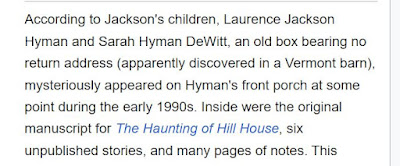The 1996 Shirley Jackson anthology Just An Ordinary Day was given to me a few years ago, and I was surpised at the time that there'd be unpublished work by the author. Once the internet happened, I'd assumed that anybody who had any work by a well-known author would have found a way to share it with the work and/or make some money with it.
Once I read the introduction, I understood that the stories had been in a box that no one had seen since the early 1960s, as Shirley Jackson had died in 1965. From the Wikipedia entry for the book:
I was also intrigued to learn that some of the stories in the volume were revised, because Jackson's son and daughter had gone through the notes from this box from the barn, and realized that there were alternative versions of some stories. The unpublished stories were a great find, yes, but as a writer I was excited to know that someone had saved the notes and then that the family had made use of them.
Do I have notes of my own? I sure do. And I've been very reluctant to let them go. In part, this is because I had a house fire in 1988 which almost destroyed the only copies of a completed novel and most of my short stories, some published and some unpublished. There was fire damage to some of the novel pages and it was a great help to have notes to rebuild sentences and paragraphs from.
Now I realize I have to do the most important work first. I don't have enough days in front of me to go through pages of notes about already-finished stories and novels to make tweaks and adjustments. I might not even agree with the proposed changes since I wrote these notes years ago. I am luckier than Shirley Jackson, as I've already gotten twenty years more life than she had. But no family member of mine has the time or energy to go through my notes and do the work I could have done ealier in life if I'd made the effort. When I go, these manuscripts and notes will go into the recycling.
I've know this for a while, but this last week I had a mental breakthrough. I realized that I couldn't let go of some of these typescipts and edited pages and handwritten drafts because each physical page is so evocative. I remember being the person who did this work using a golf pencil or a Bic pen or a Flair felt-tipped pen or a manual typewriter or a PC that had two floppy disk drives and no hard drive. The pages tell the story of coffee mugs I used and egg sandwiches I ate and pockets into which a page was hastily crumpled when it was time to leave wherever I was writing. There are pages which are scorched, and pages which have gotten wet, and pages so old the ink is half as dark as it used to be. I wrote when I had to use underlining instead of italics, and when I had to cover up goofs with skinny white strips of correction tape. These scraps and bit and clumps, often fastened with rusted staples and paper clips, show me how desperately I wanted to get these words written down before they were gone from my mind forever.









